Elon Musk’s Neuralink introduced the first patient to receive its brain-computer implant, demonstrating during a livestream that he can now move a computer cursor to play chess using the device. Photo: Neuralink.
#ElonMusk #Neuralink #WSJ
Elon Musk’s Neuralink introduced the first patient to receive its brain-computer implant, demonstrating during a livestream that he can now move a computer cursor to play chess using the device. Photo: Neuralink.
#ElonMusk #Neuralink #WSJ
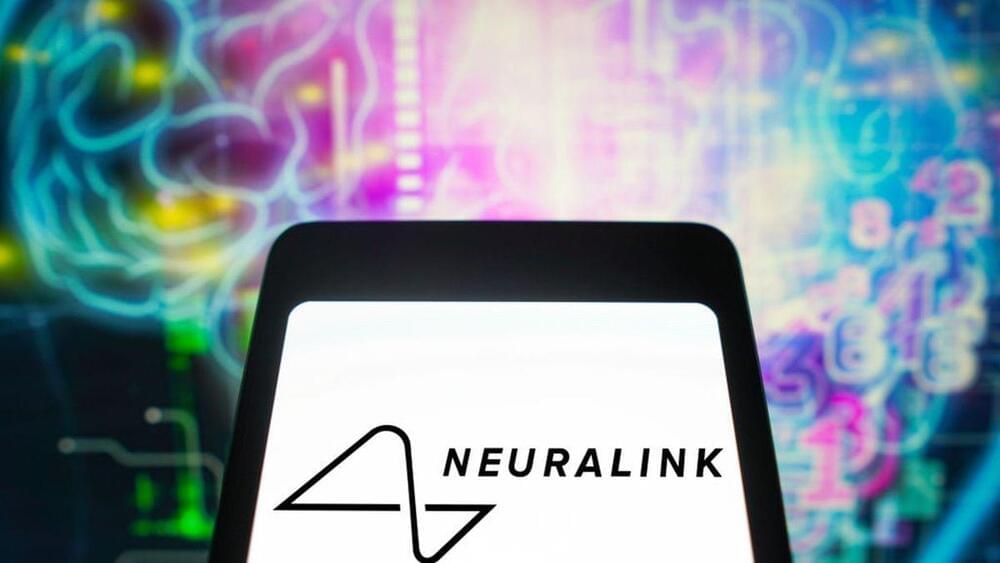
The first person with Neuralink’s computer-linked chip implanted in the surface of their brain showed off their “telekinetic” online chess-playing skills while discussing the “life-changing” procedure for the first time in a surprise livestream.
Noland Arbaugh, a 29-year-old with quadriplegia (or paralysis that affects the body from the neck down), volunteered to have the device implanted as part of Neuralink’s ongoing trial of the technology. Until now, his identity had remained a closely guarded secret.
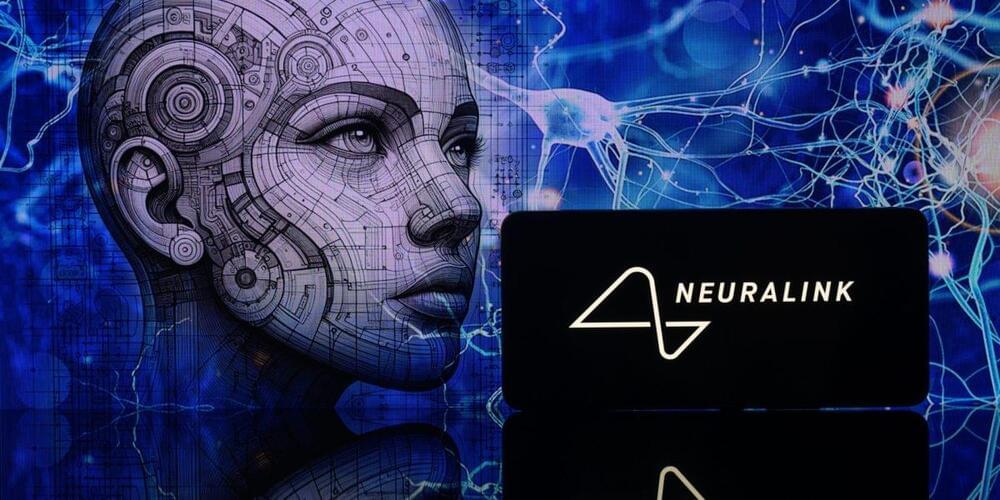
The first patient of Elon Musk’s Neuralink has been presented to the public. Noland Arbaugh had all but given up playing Civilization VI ever since a diving accident dislocated two vertebrae in his cervical spinal cord, leaving him paralyzed from the shoulders down.
When confined to his wheel chair, the 29-year-old American is totally dependent on the care of his parents, who need to shift his weight ever few hours to avoid pressure sores from sitting too long in the same position.
Moving a cursor on a display furthermore required the use of a mouth stick, a specialized assistive device used by quadriplegics.
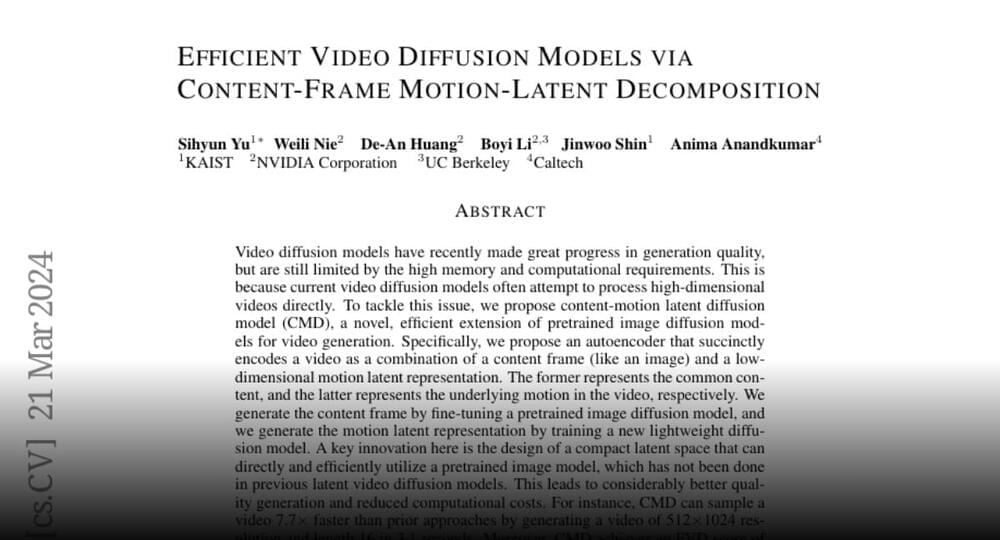
From NVIDIA efficient video diffusion models via content-frame motion-latent decomposition.
From NVIDIA
Efficient video diffusion models via content-frame motion-latent decomposition.
Video diffusion models have recently made great progress in generation quality, but are still limited by the high memory and computational requirements.
Join the discussion on this paper page.
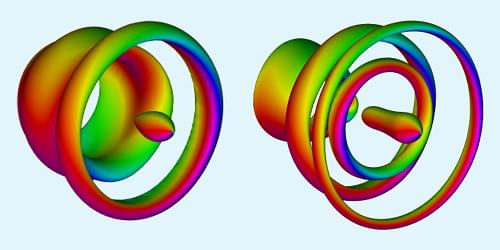
Loop-shaped structures called vortex rings are remarkably stable and are seen throughout nature, appearing as bubble rings blown by dolphins and smoke rings emitted by erupting volcanoes. Recently, scientists observed vortex rings made from electron spins in magnetic materials. These structures have properties that make them attractive for use in energy-efficient data storage and processing. Now Yizhou Liu and Naoto Nagaosa at the RIKEN Center for Emergent Matter Science in Japan have proposed a way to create such magnetic vortex rings on demand [1].
Liu and Nagaosa considered a nanometer-scale cylinder made of a “chiral” magnetic material, one whose magnetic structure differs from that of its mirror image. The magnetic vortex rings that form in such a system have more diverse topologies and greater stability than those that form in other systems. In numerical simulations, the researchers injected a pulse of electric current into their chiral magnetic cylinder through a circular trench etched into the cylinder’s top surface. They then studied how the current pulse affected the material’s spin configurations.
Liu and Nagaosa observed a chain of interconnected magnetic vortex rings form along the length of the cylinder. Varying the duration and amplitude of the injected current pulse, they were able to control the topology of the vortex rings and their connections. The researchers say that the next step is for experimentalists to replicate these findings in the lab. They also suggest that their technique could be adapted to produce magnetic vortex rings in other physical systems, such as liquid crystals and Bose-Einstein condensates.
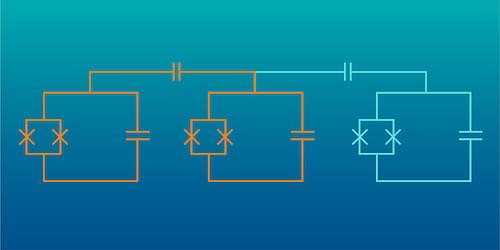
To operate reliably a quantum computer needs to correct the errors introduced into the system by noise in its hardware. Error-correction approaches typically use “logical” qubits, which are qubits made up of as many as a few thousand “physical” qubits. Logical qubits are much less error prone than physical qubits, but the hardware overhead complicates the realization of fault-tolerant quantum computers based on this approach. Now a team led by Harry Levine and Oskar Painter of the Amazon Web Services Center for Quantum Computing in California has demonstrated a new qubit design with built-in error-detection ability [1]. Painter says this qubit could serve as an alternative building block for error-correcting schemes, substantially reducing complexity.
The demonstrated qubit is an “erasure” qubit, one in which the most likely error type involves the loss, or erasure, of the qubit’s state [2]. This error is easier to spot and correct for than other qubit errors, such as those that flip the qubit’s state. Researchers have previously demonstrated erasure qubits made from single atoms. The new study makes the leap to transmons, the superconducting qubit used in the quantum processors developed by Google and IBM.
The erasure qubit of Levine, Painter, and colleagues contains three transmons. Two of the transmons are coupled together and store a qubit’s worth of information in a single, shared microwave photon. The third transmon reveals the loss of the photon—the erasure—through a shift in its operating frequency. The researchers show that in this qubit erasure errors are the dominant error type and can be detected in real time. The researchers now plan to use their new qubit to build logic gates and error-correcting circuits.

“The Most Powerful Type Of Computing Machine That Is Possible In This Universe”
Aka Hyper Computers they are based on Quantum Computing & Gravity. They are agnostic to Causality i.e. they have Indefinite Causality (Cause & Effect Relationships)
Automatski is 5,000 years ahead of everyone else. It built the worlds first Quantum Gravity Computer in ~2006.


I am, I’m slightly embarrassed to admit, quoted pretty extensively in the cover story of this week’s New Scientist magazine (alas, only available to subscribers or those willing to shell out $4.95). The story, by Michael Brooks, is about an interesting recent paper by Lucien Hardy of Perimeter Institute, on the power of “quantum gravity computers.” Lucien’s paper considers the following question: by exploiting quantum fluctuations in the causal structure of spacetime, can one efficiently solve problems that are not efficiently solvable with a garden-variety quantum computer?
As I told Brooks, I really do think this is a hell of a question, one that’s intimately related to the challenge of understanding quantum gravity itself. The trouble is that, until an actual quantum theory of gravity chooses to make itself known to us, almost everything we can say about the question is pure speculation.
But of course, pure speculation is what New Scientist gobbles up with french fries and coleslaw. And so, knowing what kind of story they were going to run, I did my best to advocate giving reality at least a few column inches. Fortunately, the end result isn’t quite as bad as I’d feared.
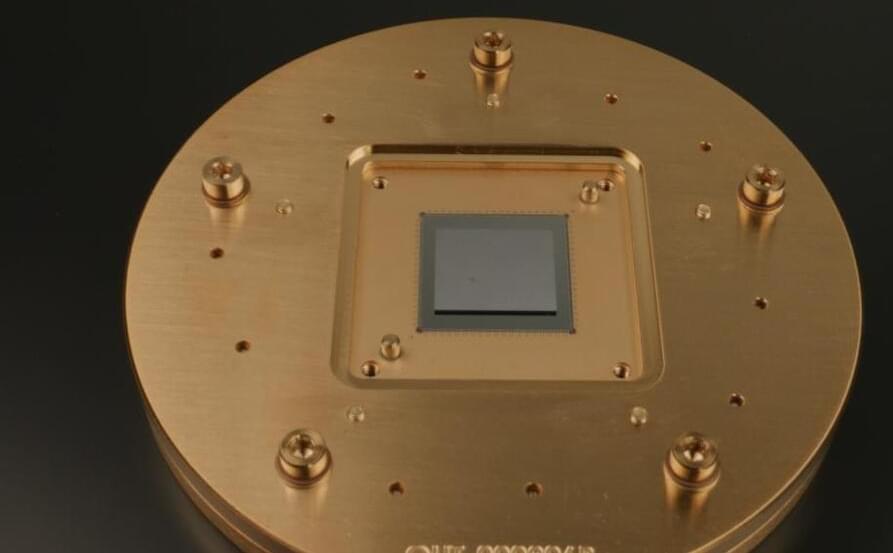
Demonstrating a long-coherence dual-rail erasure qubit using tunable transmons.
AWS today reported demonstrating an improved approach to quantum error correction that accounts for flip and phase errors in qubits with less overhead (redundant qubits) and on time scales that allow for effective error correction. The work, published today in APS Physical Review X, uses what’s called dual-rail erasure qubits.
Broadly, qubits undergo three types, report AWS researchers Harry Levine and Arbel Haim, in a blog (A new building block for error-corrected quantum computers) today, “[The] vast majority of errors (96%) in our dual-rail qubit are erasure errors (leakage to |00 ⟩), with only a small fraction (4%) of residual (silent) bit-flip and phase-flip errors. This is a strong indicator that if we can accurately flag the erasures, then we can efficiently correct most errors that occur in this system.”